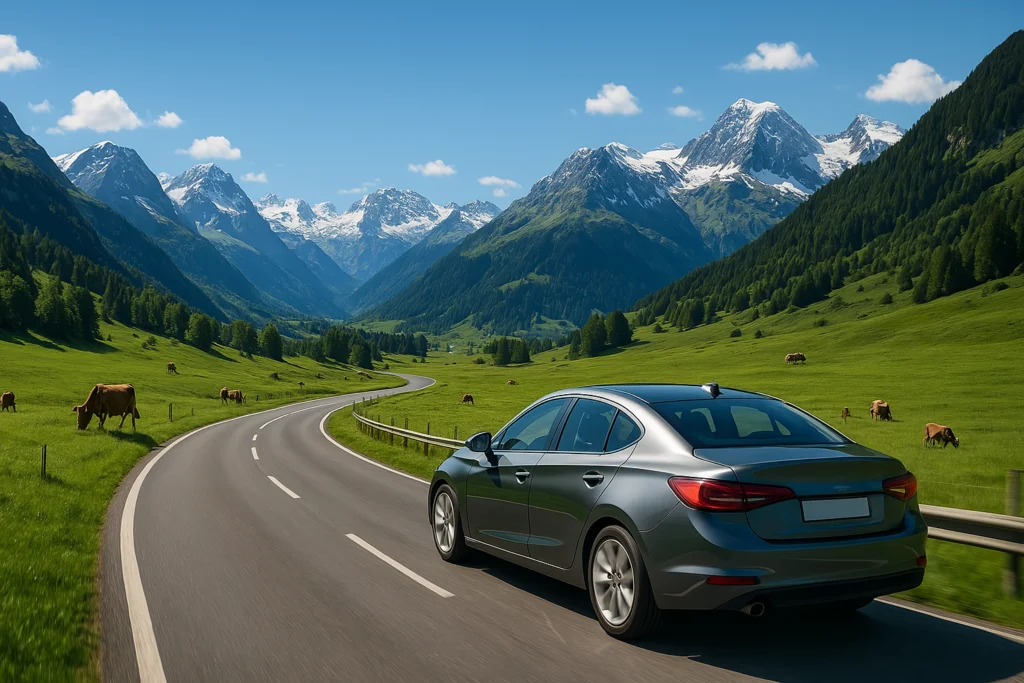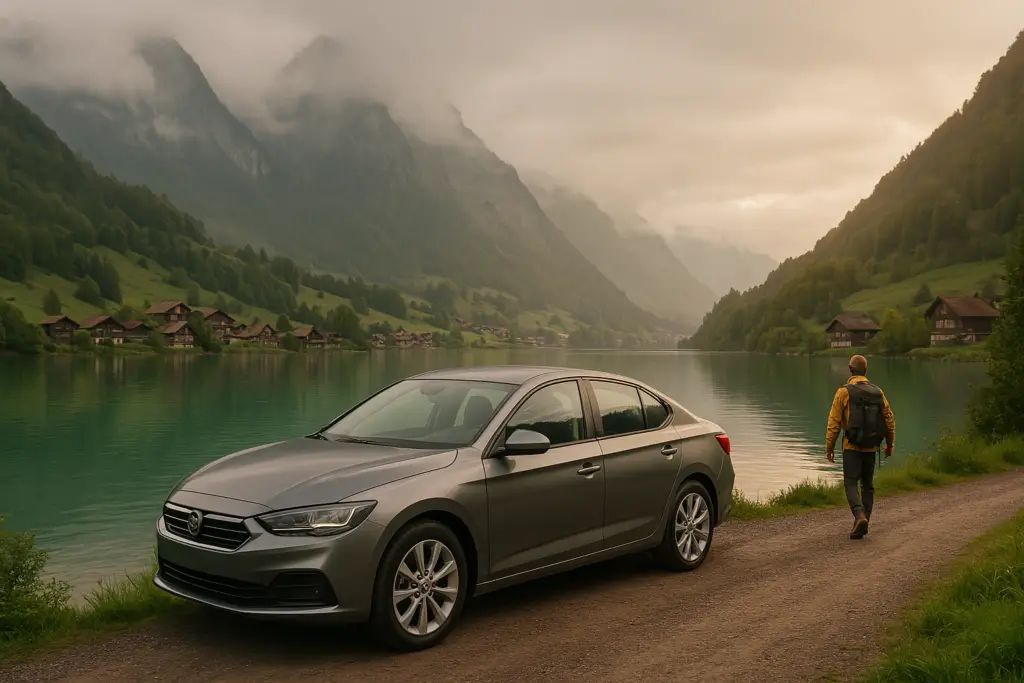Renting a car in Switzerland opens up endless travel opportunities. It lets you explore the country at your own pace.
Switzerland boasts stunning landscapes, charming towns, and vibrant cities. To fully experience its beauty, renting a car can be the best option. This guide will help you navigate the process of renting a car in Switzerland. From understanding the requirements to choosing the right vehicle, we’ll cover all essential aspects.
Whether you’re planning to drive through the Alps or visit historic cities, this guide will provide valuable insights. Get ready to hit the road and make the most of your Swiss adventure. Let’s dive into the ultimate guide for renting a car in Switzerland.
Choosing The Right Rental Company
Planning to rent a car in Switzerland? Choosing the right rental company is crucial for a smooth experience. The right company ensures reliability, good customer service, and fair pricing. Let’s explore how to make the best choice.
Top Rental Agencies
Switzerland has a variety of rental agencies to choose from. Some of the top rental agencies include:
- Europcar: Known for its extensive network and excellent customer service.
- Hertz: Offers a wide range of vehicles and competitive pricing.
- Sixt: Popular for its luxury car options and flexible rental terms.
- Avis: Renowned for its loyalty programs and comprehensive insurance packages.
These agencies offer various benefits. Let’s compare some key features:
| Agency | Network | Vehicle Variety | Customer Service |
|---|---|---|---|
| Europcar | Extensive | High | Excellent |
| Hertz | Wide | Varied | Good |
| Sixt | Moderate | Luxury Options | Good |
| Avis | Broad | Comprehensive | Excellent |
These agencies have strong reputations. They provide reliable services and a wide range of vehicles to suit different needs.
Local Vs. International Companies
Choosing between local and international rental companies can be tricky. Each has its pros and cons:
- Local Companies:
- Better local knowledge.
- Often have unique vehicles.
- May offer personalized customer service.
- Possibly lower prices.
- International Companies:
- Wider network of offices.
- Standardized service quality.
- Better online booking systems.
- More recognized brands.
Consider your needs. If you prefer a personalized experience, a local company might be better. If you value consistency, go for an international company.
Here is a quick comparison:
| Feature | Local Companies | International Companies |
|---|---|---|
| Local Knowledge | High | Moderate |
| Vehicle Variety | Unique | Standardized |
| Customer Service | Personalized | Consistent |
| Pricing | Lower | Variable |
Both types of companies have their advantages. Whether it’s a personalized touch or a standardized service, you’ll find a company that fits your needs in Switzerland.
Understanding Rental Requirements

Switzerland is a breathtaking destination with stunning landscapes and picturesque towns. aBefore hitting the road, it’s crucial to understand the rental requirements. This guide will help you navigate the essentials, ensuring a smooth and enjoyable experience.
Age Restrictions
Age restrictions are an important consideration for anyone looking to rent a car in Switzerland. Generally, the minimum age to rent a car is 20 years. However, this can vary depending on the rental company and the type of car.
Here are some key points to keep in mind:
- Minimum Age: Most rental companies require drivers to be at least 20 years old.
- Young Driver Fee: Drivers under 25 may need to pay an extra fee.
- Age Limits for Luxury Cars: Some luxury car rentals may have a higher age limit, often 25 or 30 years.
To give you a clearer picture, here’s a table summarizing the age restrictions:
| Car Type | Minimum Age | Young Driver Fee |
|---|---|---|
| Economy | 20 | Yes (under 25) |
| Standard | 21 | Yes (under 25) |
| Luxury | 25 | No |
Always check the specific age requirements of the rental company you choose. This will help avoid any surprises.
Driver’s License Needs
Having the correct driver’s license is essential for renting a car in Switzerland. Swiss rental companies have strict requirements to ensure safety and compliance.
Here’s what you need:
- Valid Driver’s License: You need a valid driver’s license from your home country.
- International Driving Permit (IDP): If your license is not in English, an IDP is recommended. This helps with translation and verification.
- License Validity: Your license must be valid for at least one year.
For a quick reference, here’s a table outlining the requirements:
| Requirement | Details |
|---|---|
| Driver’s License | Valid from home country |
| International Driving Permit | Recommended if license is not in English |
| License Validity | Minimum one year |
Ensure your license meets these criteria. This will make the rental process smoother.
Understanding these requirements is key to a hassle-free car rental experience in Switzerland. Plan ahead, and you’ll be ready to explore this beautiful country!
Rental Policies To Know
Switzerland is a stunning country with picturesque landscapes and charming cities. Renting a car is a great way to explore its beauty. Before you hit the road, it’s important to understand the rental policies. This guide will help you navigate the crucial aspects of car rental in Switzerland. Let’s dive into the key policies you need to know.
Insurance Options
When renting a car in Switzerland, understanding the insurance options is essential. Most rental companies offer several types of insurance to protect you in case of an accident or damage.
- Theft Protection (TP): Covers you if the car is stolen.
- Third-Party Liability: This insurance is usually included and covers damage to other vehicles or property.
It’s vital to read the fine print of each insurance policy. Check the deductible amounts, as these can vary significantly. Some credit card companies also offer rental car insurance, so review your card benefits before purchasing additional coverage.
| Insurance Type | Coverage | Deductible |
|---|---|---|
| CDW | Damage to rental car | Varies |
| TP | Theft of rental car | Varies |
| Third-Party Liability | Damage to others | Usually included |
| PAI | Medical expenses | Varies |
Consider your needs and budget when choosing insurance. Proper coverage can save you a lot of stress and money in case something goes wrong.
Fuel Policies
Fuel policies are another important aspect of renting a car in Switzerland. Rental companies typically offer different fuel options.
Here are the common fuel policies:
- Full-to-Full: Pick up the car with a full tank and return it with a full tank. This is the most cost-effective option if you refuel before returning the car.
- Prepaid Fuel: Pay for a full tank at the start and return the car with any level of fuel. This can be convenient but is often more expensive.
- Full-to-Empty: Return the car with an empty tank. The rental company will charge for refueling, which usually includes a service fee.
We recommend the full-to-full policy for most travelers. It is straightforward and avoids unexpected fees. If you choose prepaid fuel, calculate whether the convenience justifies the extra cost.
Here is a quick comparison of the fuel policies:
| Fuel Policy | Description | Best For |
|---|---|---|
| Full-to-Full | Return with a full tank | Cost-conscious travelers |
| Prepaid Fuel | Pay upfront, return with any level | Convenience seekers |
| Full-to-Empty | Return with an empty tank | Short trips |
Understanding fuel policies can save you money and hassle. Choose the one that fits your travel plans and budget.
Exploring Rental Costs

Switzerland offers stunning landscapes and charming cities. Renting a car is a great way to explore. But knowing the rental costs is crucial. Let’s dive into the daily rates and hidden fees.
Daily Rates
The daily rates for renting a car in Switzerland vary. Factors like car type, rental company, and season play a role. Here’s a breakdown:
- Economy Cars: These are the most affordable. Rates start at around CHF 50 per day.
- Compact Cars: A bit more spacious. Expect to pay between CHF 60 and CHF 80 daily.
- SUVs: Ideal for mountainous areas. Prices range from CHF 100 to CHF 150 per day.
- Luxury Cars: For a premium experience. Rates start at CHF 200 and can go up significantly.
Here’s a table to illustrate:
| Car Type | 1-3 Days | 4-7 Days | 8+ Days |
|---|---|---|---|
| Economy | CHF 50/day | CHF 45/day | CHF 40/day |
| Compact | CHF 70/day | CHF 65/day | CHF 60/day |
| SUV | CHF 120/day | CHF 110/day | CHF 100/day |
| Luxury | CHF 250/day | CHF 240/day | CHF 230/day |
Weekends and holidays might have higher rates. Booking early can help secure better deals. Always compare prices from different rental companies.
Hidden Fees
Hidden fees can surprise renters. Common hidden fees include:
- Insurance Fees: Basic insurance is usually included. But additional coverage options can add to the cost.
- Airport Surcharges: Renting at the airport can include extra fees. These cover the convenience of picking up and dropping off at the airport.
- Additional Driver Fees: Adding another driver can cost extra. This fee varies by company.
Other potential fees:
- Late Return Fees: Returning the car late can lead to extra charges. It’s best to return on time or notify the company if you’re running late.
- Young Driver Fees: Drivers under 25 might face additional charges. This is to cover the perceived higher risk of younger drivers.
- Cross-Border Fees: Planning to drive to a neighboring country? Some companies charge extra for this.
- Equipment Rental: Need a GPS, child seat, or winter tires? These can add to your rental cost.
Always read the rental agreement thoroughly. Understanding all potential fees ensures a smooth rental experience. Planning and knowing these details can save money and stress.
Navigating Swiss Roads
Switzerland is known for its stunning landscapes and pristine roads. Renting a car in this beautiful country offers the freedom to explore at your own pace. Understanding the nuances of navigating Swiss roads will make your journey smoother and more enjoyable.
Tolls And Vignettes
Swiss highways are well-maintained and come with a fee. To drive on these roads, you need a vignette. This is a sticker placed on your windshield. It acts as a toll payment for using the highways.
Vignettes are mandatory for all motor vehicles. You can purchase them at border crossings, gas stations, and post offices. The cost of a vignette is CHF 40 and it is valid for one year.
Here are some key points about vignettes:
- Mandatory: All cars, motorcycles, and trailers require a vignette.
- Purchase Locations: Available at border crossings, gas stations, and post offices.
- Cost: CHF 40.
Failure to display a vignette can result in a fine of CHF 200. Always ensure it is visible on your windshield. For short trips, this fee is still reasonable compared to daily tolls in other countries.
For non-highway roads, there are no tolls. This makes exploring rural areas and small towns more economical.
Here’s a quick table for easy reference:
| Vignette Details | Information |
|---|---|
| Mandatory for Vehicles | Cars, Motorcycles, Trailers |
| Purchase Locations | Border Crossings, Gas Stations, Post Offices |
| Validity | One Year |
| Cost | CHF 40 |
| Fine for Missing Vignette | CHF 200 |
Driving Rules And Regulations
Driving in Switzerland is a pleasant experience with clear rules and regulations. Familiarizing yourself with these rules ensures safety and compliance.
Here are some fundamental rules:
- Speed Limits: 50 km/h in towns, 80 km/h on open roads, 120 km/h on highways.
- Seat Belts: Mandatory for all passengers.
- Children: Children under 12 must use appropriate child seats.
- Alcohol Limits: Blood alcohol limit is 0.05%. Strict enforcement.
- Mobile Phones: Use prohibited without hands-free devices.
Swiss traffic signs are easy to understand. They use international symbols. Always adhere to speed limits. Speed cameras are common.
Winter driving requires extra caution. Roads can be icy. Equipping your car with winter tires is recommended. In mountainous areas, snow chains might be necessary.
Parking regulations are strict. Pay attention to parking signs. Blue zones require a parking disc. These discs are available at police stations and gas stations. Display the disc on your dashboard.
Here’s a quick table for essential driving rules:
| Driving Rules | Details |
|---|---|
| Speed Limits | 50 km/h in towns, 80 km/h on open roads, 120 km/h on highways |
| Seat Belts | Mandatory for all passengers |
| Child Seats | Required for children under 12 |
| Alcohol Limit | 0.05% BAC |
| Mobile Phones | Prohibited without hands-free devices |
| Winter Tires | Recommended during winter |
By understanding these rules, you can enjoy a safe and memorable road trip in Switzerland.
Best Time To Rent
Switzerland, with its stunning landscapes and picturesque towns, is a dream destination for many. Renting a car is a great way to explore this beautiful country at your own pace. But the timing of your rental can make a big difference. Understanding the best time to rent a car in Switzerland can help you save money and enjoy a better experience.
Peak Seasons
Switzerland’s peak travel seasons are typically during the summer months (June to August) and winter holidays (December to February). During these periods, the demand for rental cars is high. Many tourists flock to the Alps for skiing in winter and hiking in summer.
Here are some things to consider during peak seasons:
- Higher Prices: Rental rates tend to be higher due to increased demand. Booking early can help secure better rates.
- Limited Availability: Popular car models may be in short supply.
- Busy Roads: Tourist spots and major highways can be crowded.
Despite these challenges, peak seasons offer some unique advantages:
- Events and Festivals: Experience local culture and festivities that are abundant during these times.
- Weather: Enjoy the best weather for outdoor activities, whether skiing or hiking.
To give you a clearer picture, here’s a table summarizing the pros and cons of renting a car during peak seasons:
| Pros | Cons |
|---|---|
| Access to seasonal activities | Higher rental costs |
| Festivals and events | Limited car availability |
| Optimal weather | Potential traffic congestion |
Off-peak Benefits
Off-peak seasons in Switzerland are generally from March to May and September to November. These periods are less crowded, offering a different set of advantages for car renters.
Here are some benefits of renting during off-peak times:
- Lower Prices: Rental rates drop significantly. You can find great deals and save money.
- Wide Availability: More car options are available. Choose the perfect car for your trip without hassle.
- Less Crowded: Enjoy a more relaxed travel experience. Less traffic and fewer tourists at popular sites.
Traveling during off-peak seasons also allows you to experience Switzerland in a unique way:
- Autumn Colors: Witness the stunning fall foliage in the Swiss countryside.
- Spring Blossoms: Enjoy the beautiful spring blooms and mild weather.
To highlight the benefits of off-peak rentals, here’s a comparison table:
| Pros | Cons |
|---|---|
| Cheaper rental rates | Unpredictable weather |
| More car choices | Limited events and festivals |
| Less crowded tourist spots | Shorter daylight hours |
Picking The Right Vehicle
Renting a car in Switzerland can be a fantastic way to explore the country’s stunning landscapes and picturesque towns at your own pace. However, picking the right vehicle is crucial to ensure a smooth and enjoyable journey. From navigating narrow mountain roads to finding parking in busy cities, your choice of car can significantly impact your travel experience. This section will guide you through the types of cars available and the size considerations to help you make the best decision for your Swiss adventure.
Types Of Cars
Switzerland offers a wide range of rental cars to suit different needs and preferences. Here are some common types you can consider:
- Economy Cars: Ideal for budget travelers. These cars are fuel-efficient and easy to maneuver in cities.
- Compact Cars: Slightly larger than economy cars, offering more comfort and space for luggage.
- Mid-size Cars: A good balance of comfort and fuel efficiency, suitable for longer trips.
- SUVs: Perfect for mountainous regions. These vehicles offer better traction and higher ground clearance.
- Vans: Great for group travel. a
Choosing the right type of car depends on your travel plans and personal preferences. If you plan to explore cities like Zurich or Geneva, an economy or compact car might be the best choice. For those heading to the Alps, an SUV can provide the necessary power and stability.
Size Considerations
The size of your rental car can greatly influence your comfort and convenience. Here are some factors to consider:
- Number of Passengers: Ensure the car can comfortably accommodate all travelers. A compact car may be sufficient for solo travelers or couples, while families or groups might need a mid-size car or van.
- Luggage Space: Check the boot capacity. If you have a lot of luggage, a larger car or SUV might be necessary.
- Road Conditions: Swiss roads vary from narrow alpine paths to wide highways. Larger cars may struggle on narrow roads, while smaller cars can be easier to park in tight spots.
- Fuel Efficiency: Smaller cars generally consume less fuel, which can be a cost-saving factor, especially for long trips.
| Car Size | Passengers | Luggage | Fuel Efficiency |
|---|---|---|---|
| Economy | 2-4 | 2 small bags | High |
| Compact | 4 | 2-3 medium bags | Medium |
| Mid-size | 5 | 3-4 medium bags | Medium |
| SUV | 5-7 | 4-5 large bags | Low |
Taking these factors into account can help you select a car that meets your needs. The right size ensures comfort and ease, whether you’re navigating city streets or mountain roads.
Returning The Car
Returning the car after an amazing trip around Switzerland can feel bittersweet. Ensuring a smooth return process will help you avoid any additional charges and leave you with a positive experience. This section covers essential tips for inspection and drop-off locations to make your car rental return hassle-free.
Inspection Tips
Before returning the car, conducting a thorough inspection is crucial. This will help you identify any issues and avoid unexpected charges. Here are some valuable tips:
- Clean the Car: Remove all personal belongings and ensure the interior is clean. Some rental agencies may charge a fee for excessive dirt.
- Check for Damages: Look for any new scratches, dents, or damages. Compare with the initial inspection report to ensure all previous damages are noted.
- Fuel Level: Ensure the fuel level matches the rental agreement. Most agencies require a full tank upon return, so fill it up to avoid refueling charges.
- Inspect Tires: Check for any punctures or significant wear. Ensure the spare tire and tools are intact and in place.
- Review Mileage: Note the final mileage and ensure it aligns with your rental agreement to avoid additional mileage fees.
Documenting the car’s condition with photos and videos can be helpful. Ensure you have all necessary documents, such as the rental agreement and initial inspection report, ready for the return process.
Drop-off Locations
Switzerland offers various convenient drop-off locations for rental cars. Knowing your options can save time and effort. Here are some common drop-off locations:
- Airport Locations: Major airports like Zurich, Geneva, and Basel have rental car return facilities. These are ideal if you’re catching a flight soon after.
- City Centers: Most rental agencies have offices in city centers. This option is convenient if you’re staying in the city before returning the car.
- Train Stations: Some agencies offer drop-off points at major train stations. This is useful if you’re continuing your journey by train.
- Hotel Drop-off: Certain rental companies provide hotel drop-off services. Check with your agency if this option is available.
Returning the car to a different location from where you picked it up might incur a one-way fee. Always confirm the drop-off location with your rental agency to avoid surprises. Plan your route to the drop-off point in advance, considering traffic and time constraints.
| Location | Benefits |
|---|---|
| Airport | Convenient for travelers catching flights |
| City Center | Easy access if staying in the city |
| Train Station | Ideal for continuing the journey by train |
| Hotel Drop-off | Convenient for hotel stays |
Choose the drop-off location that best suits your travel plans and ensure a smooth end to your car rental experience in Switzerland.

Frequently Asked Questions
Is It A Good Idea To Rent A Car In Switzerland?
Yes, renting a car in Switzerland is a good idea. It offers flexibility and convenience for exploring scenic routes. Public transport is excellent, but a car provides more freedom.
How Do I Pay Tolls On A Rental Car In Switzerland?
Pay tolls in Switzerland using a rental car by purchasing a motorway vignette. It costs CHF 40 and is valid for one year.
What Is The Best Company To Rent A Car From?
Enterprise, Hertz, and Avis are top choices for car rentals. They offer competitive prices, reliable service, and extensive vehicle options.
Which Car Rental Is Best For Switzerland?
Sixt, Europcar, and Hertz are top choices for car rentals in Switzerland. They offer reliable services and a wide range of vehicles.
Conclusion
Renting a car in Switzerland can be simple and enjoyable. With the right tips, you can explore beautiful landscapes and charming cities at your own pace. Always remember to check the rental policies, insurance options, and driving rules. Plan ahead for a smooth journey.
Safe travels and happy driving in Switzerland!




